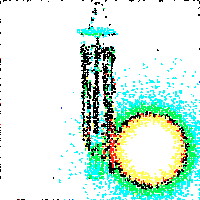Computer Music II


In the ancient past, this class was a continuation of Computer Music 1 (G6610X), but that is no longer true. Our advanced computer music seminars are now topic-oriented, and we generally choose a topic for the term that resonates with work we are doing or something that we feel might be good to explore. We wind up teaching what we like! This semester is no exception. Our plans this term are to delve into 'instrument design' with a particular emphasis on building software/DSP 'instruments' that are based upon an existing model. What does this mean? Well, we'll find out...
We do plan to get into a fair amount of down-and-dirty coding, but our trail into writing software will be marked by musical objectives. Don't worry if you haven't done any coding before, our intention is to unpack the design and development of synthesis and signal-processing software in such a manner that it will be IMMEDIATELY CLEAR AND WONDERFUL for all of you. Seriously, we plan to spend a lot of time going through how things work, and we also have several visitors working at the CMC this term who will be assisting us (i.e. you) in learning the techniques that we cover.
The class is also an excuse to teach how to use certain music programming languages. We'll be concentrating on three DSP development environments in this class: RTcmix, SuperCollider and the new Max/MSP [gen~] feature. Again, don't worry if you have no deep familiarity with these languages. The point of the class is to show you how they may be employed in your music. If you've never heard of any of these, this may not be the best class for you to take.
As always, we'll also have a couple of special guest-stars coming into the
class as the term progresses. Stay tuned for partciular info
about them. They will be listed on the
course syllabus
as soon as things get set.
Here are a few links to software that we probably will be using in class:
Please let us know if you are having problems getting equipment or
software to work for you. In general, if you are having difficulty
understanding the programming paradigms
we are using or the applications and information we are covering.
be sure to talk to us. We'll be happy to sit down and work through
any issues with you.
Each week we do will become a link to information relating to that
class. We'll try to keep up with linking in class patches, examples
and information, but we may fall behind. Yell at us when we do.
It's always a good idea to make an appointment to see me, even during my purported office hours, because I often have to run around campus like a maniac doing strange, computer-music stuff. If you need to contact someone at the CMC or Music Department using your actual voice, the relevant phone numbers are:
I say this every year, and generally people believe it (I think): by this point in your career the last thing you should be worrying about is a grade. The main thing is to find something that you'd really like to do and then do it. Please don't try to impress us with your consummate knowledge and skill, we are more impressed by people who do things. Honest!
Hope you enjoy the class!
